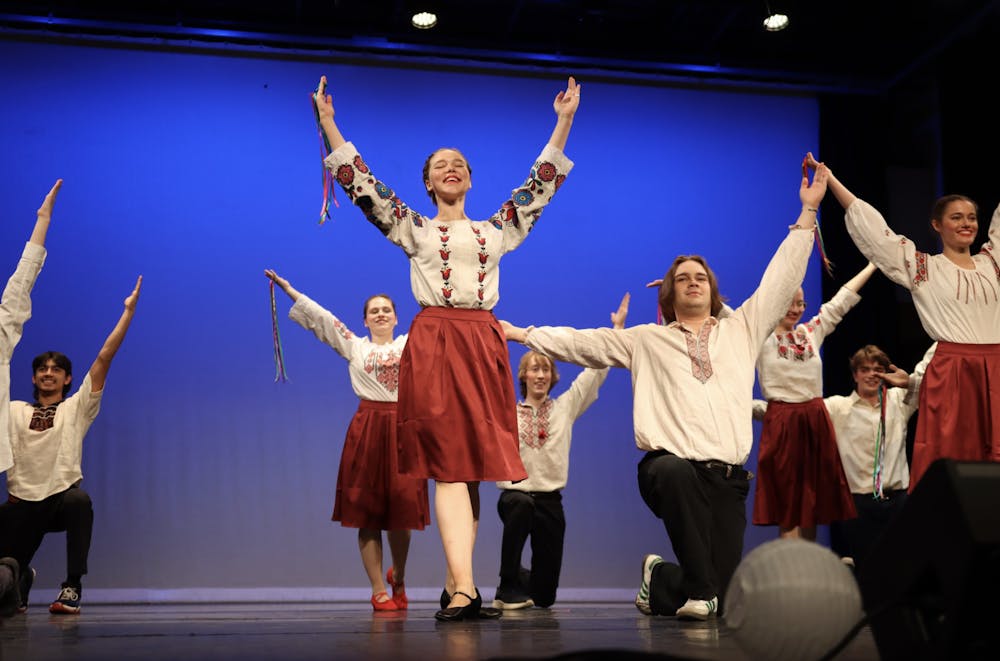For international students at Middlebury, making sense of the turbulence in today’s world — from ongoing wars in Ukraine and the Middle East to the U.S. presidential election — can be particularly challenging in rural Vermont. Amidst the weight of global challenges, Middlebury’s International Student Organization (ISO) organized International Week, which student organizers hoped would create an atmosphere of celebration, recognition and resilience on campus.
What used to be ISO weekend has evolved into a full week of programming. Co-president of ISO Changchang Ma ’26, who has been part of the organization for more than two years, has witnessed the board condense into an 11-person group, allowing more efficiency and direct communication. She recognized the inherent complexity of approaching a week meant for joy in an increasingly complicated world.
“In a world that’s not perfect by any means, I think complexity is something that we really try to portray, be it through events that are more political or events that touch conflict,” she told The Campus.
The ISO show on Saturday, the week’s capstone event, embodied that complexity by showcasing performances with cultural and political significance.
Sofiia Tretiak ’27 from Lviv, Ukraine, who has 12 years of dance experience and performed in the two Ukrainian dances for the show, told The Campus why she believes using performance as a cultural and political message is valuable.
“Students here trying to do what we can to keep reminding the Middlebury community about the ongoing Russian-Ukrainian war and the continued attempts of Russia to erase not only our homes, our cities, but also our culture, our identity, our language and everything that is so dear to us,” she said.
Tretiak also called for students to start learning about Ukraine beyond the framework of war and to acknowledge that the country has long-lasting traditions and history.
“It is my desire to share the richness and beauty of Ukrainian culture, and in particular our unique and very diverse folk dances that can be both melancholic, graceful and flowing,” she said. “I feel it’s important to showcase these energies, and that we’re proud of who we are and we’re not defined by just the war.”
While performances like this are planned carefully, Co-president of ISO Shloka Raghavan ’27 said one challenge was coordinating across a wide number of students representing different groups.
While it i never an easy task to bring forth deeper conversations about cultural identities and diversity through completely student-run stage shows, the capacity of which is often limited by assistance and time, Ma hopes having the production process as a collaborative experience can serve to strengthen the community.
“International students come together from so many different backgrounds around the world, and to put an effort to produce something together, we meet people, connect with people, get to know another person in a deeper sense, beyond, you know, taking the same classes,” she said.
The ISO is also looking to enhance its internal diversity by developing a new liaison program, which was first proposed during an open house feedback session in September. It would allow ISO to partner with other student organizations on campus to highlight specific regions.
“We want more regional diversity in our events. Since most of our board members are from a certain demographic, that tends to be more of the events we do because that’s what we know better, but we’re trying to get regional liaisons to make sure we do have more variety of events,” Raghavan said.
Ma explained that it is still in the initial stages of planning as ISO consults faculty and students for more input.
“As we talked to many students and some staff members about it, the first question is, how do we divide up the world? The world's division is already a very Western concept,” she said. “Other questions include, does representation in this way necessarily mean that this will be more inclusive?” Ma said.
The week’s pilot liaison event is a Caribbean dinner partnered with the Caribbean Student Association, a new club on campus, in collaboration with The House, a local non-profit. ISO provided the funding for the dinner and liaison Kiara Dookie ’26 cooked for the event.
Annette Franklin, founder of The House, was delighted to make new connections and to offer up the space.
“It was really great and so many new students showed up. There were 25 here, and 20 of them were students I hadn’t met before,” she said.
Franklin has been deeply engaged with the international student community on campus since 2011. Given the daily difficulties of living in today’s world, Franklin said she believes that having consistent spaces for people to spend time together becomes in itself an effort in solidarity.
“It’s really life-giving for me. Sometimes it can be emotionally challenging hearing students who are walking through difficult life things, and I’d like to be there for them. I enjoy talking to students, finding out their stories, and just taking the time to sit and listen to them, which can be challenging in big groups, but to try to talk to each person,” she said.
While the global political climate may be uncertain, the ISO’s week of events served as a reminder that international students can carve out moments of joy and mutual understanding and that it takes small actions to build meaningful connections. For many of the students involved, this week was not just about cultural celebration, but also about affirming the importance of community in a world that feels increasingly fractured.
“We're not only bodies of culture, but we have different lived experiences that reflect the reality of the world, and I think that's part of humanizing people, that's part of living in a community,” Ma said.




